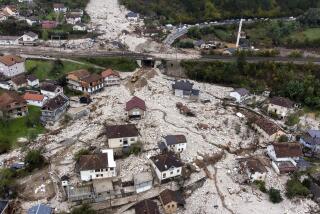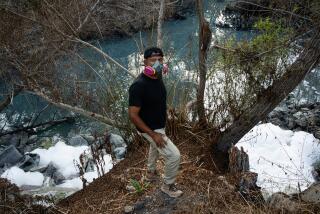A Cyanide Spill Poisons More Than Fish
KANJIZA, Yugoslavia — In the perpetual state of disaster called Serbia, everything is political--even dead fish.
A toxic wave of cyanide and heavy metals released from a Romanian gold mine two weeks ago first coursed through neighboring Hungary’s Tisza River, killing tons of fish in its path. When it crossed into northern Yugoslavia on Friday, the surging catastrophe became the problem of Kanjiza Mayor Istvan Backulin.
He was ready with a volunteer team of 10 fishermen wearing rubber suits that had been stockpiled in case of nuclear, biological or chemical warfare. Deployed in five boats, they pulled more than 350 pounds of dead fish from the river, which is spelled Tisa in Serbia.
It was left to the mayor to figure out how to dispose of the toxic waste, including a 77-pound catfish. The head alone of another giant catfish weighed 40 pounds, “so you can imagine how big that fish was,” Backulin said Tuesday.
The government of Serbia, the dominant Yugoslav republic, already has enough problems and didn’t want to take on Backulin’s. It didn’t help that he is an ethnic Hungarian in a republic dominated by Serbs.
And no nearby towns--all struggling to get rid of their own haul of dead fish--were willing to take Backulin’s catch off his hands, even though at least one of the municipalities is run by the same ethnic Hungarian opposition party that got Backulin elected.
Burial in Soggy Soil Would Add to Disaster
Nature was no help either. After heavy rains last year, the water table in Serbia’s northern Vojvodina region is so close to the soil’s surface that farmers’ fields are turning to swamps. It is no place to bury fish laced with cyanide and heavy metals, which would easily leach into the water supply.
So Backulin is stuck with his toxic waste, wrapped in nylon bags, piled in a sealed container and under guard in a compound run by the municipality’s garbage collectors. Naturally, the mayor is not pleased.
“This is a crime against life--a genocide over the animal world,” Backulin, a politician not prone to understatement, said through a translator. “I am using the word ‘genocide’ because the Tisa had so many species of fish and all are completely lost now.
“Even the bacteria that would make the fish meat decompose are also dead,” he said. “At the bottom of the river, there are plenty more dead fish.”
As the river warms up, the dead fish will rise, and towns along the river’s banks will have an even bigger--and more expensive--problem on their hands, Backulin predicted.
Hungary’s government says that more than 100 tons of dead fish have been hauled from the river in the past week, while Yugoslav workers have collected 15 more tons since Friday, Serbian Environment Minister Branislav Blazic told reporters Tuesday.
“The whole ecosystem of the river has been destroyed,” he said. “Even if we manage to return the fish there, they will have nothing to feed on because the fauna has been completely destroyed.”
The toxic wave, which Blazic said is about 30 miles long, has also entered the Danube River, Europe’s second-longest waterway.
The massive spill occurred at the Baia Mare gold mine in northwestern Romania when a waste-containment pond overflowed into nearby streams. The gold mine has been operating with Australian partner Esmeralda Exploration Ltd. since the mid-1980s, Romanian Foreign Minister Petre Roman said. Romania’s government and the Perth-based company have insisted that reports of the environmental damage are exaggerated.
The European Union’s environment commissioner, Margot Wallstrom, was scheduled to head today to Budapest, the Hungarian capital, to meet with Hungary’s environment minister and planned to inspect the Danube from its Hungarian and Romanian banks Thursday.
“We cannot underestimate the seriousness of this,” European Union spokeswoman Pia Ahrenkilde-Hansen told reporters in Brussels on Tuesday. “It seems to be a very serious ecological accident.”
The lead and mercury in the spill pose a longer-term threat to the Danube River system because heavy metals can’t be diluted, as the cyanide has been, and so they “stay for a much longer period of time” in the water, she added.
Although the government in Belgrade, capital of both Serbia and Yugoslavia, was demanding compensation for the disaster Tuesday, Serbian officials didn’t prepare for the crisis as the toxic wave headed from Romania to northern Yugoslavia, and they have done little since it arrived, Backulin charged.
“They don’t want to declare it toxic material officially because if they do, it would be their responsibility to cover all of the expenses,” he said. “The government didn’t do anything at all, in the early phase, to inform citizens what was coming our way.”
Backulin said he expects Serbia’s government will soon order the town of Senta, about 12 miles south, to dispose of his town’s dead fish. But Senta Mayor Attila Juhasz was still angrily refusing to do so Tuesday because he doesn’t think Backulin has done enough to help with the emergency cleanup.
Though Political Allies, Mayors at Loggerheads
Both mayors belong to the opposition Alliance of Vojvodina Hungarians, which makes them allies against Yugoslav President Slobodan Milosevic’s ruling Socialist Party. When it comes to dealing with mounds of lethal fish, however, the mayors don’t get along.
Alerted by Hungarian radio reports that the spill was headed his town’s way, Juhasz had crews of hunters and fishermen waiting to net dead fish when they started floating by about 3 p.m. Friday.
The workers collected 3,300 pounds of fish and buried the waste in layers of lime at an approved landfill site, he said. The cleanup teams have also found the corpses of dogs and cats and of sea gulls and other birds, raising concerns that the poison might work its way farther along the food chain, the mayor added.
Cyanide levels near Senta peaked at eight times the allowed limit at 2 a.m. Saturday, and within 36 hours the toxic wave had passed, he added. Using sonar, local fishermen estimated Tuesday that only 20% of the river’s fish are still alive, the ones that feed near the river bottom, Juhasz said.
Juhasz also wants money from Belgrade to offset the cleanup costs and longer-term damage to the local economy.
Given the political differences with Belgrade, Juhasz would gladly settle for a break on the $50,000 fine that the Environment Ministry levies against his town each year. Because Senta doesn’t have a sewage treatment plant, the town’s toilets flush into the Tisa.
Instead of paying the annual fine, he said, the town could spend the money on building a treatment facility.
After surviving the North Atlantic Treaty Organization’s air attacks last spring, years of foreign sanctions and what Juhasz called Belgrade’s “inner sanctions” against his opposition municipal government, the mayor is lighthearted about the latest catastrophe.
His favorite joke making the rounds at City Hall says the town should change its coat of arms, a symbol the founding fathers chose in 1506 that includes two golden keys and two fish.
“Some say we have to take the fish off now,” he said. “Or we should at least turn them around so only their backs are showing.”
More to Read
Sign up for Essential California
The most important California stories and recommendations in your inbox every morning.
You may occasionally receive promotional content from the Los Angeles Times.










